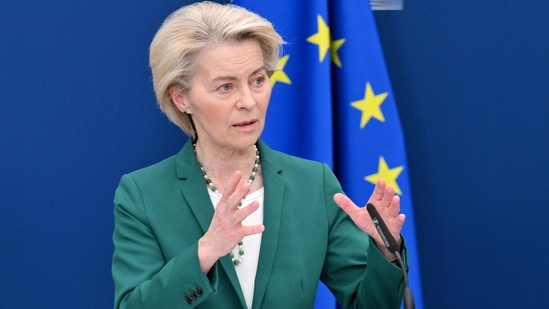### Navigating New Waters: The European Union’s Upcoming Decision on Retaliatory Tariffs
The European Union (EU) stands on the brink of a significant decision-making phase as it gears up to review and potentially enact a list of retaliatory tariffs. This move is part of a broader strategy to respond to international trade tensions and safeguard its economic interests. Within the week, EU officials are set to vet and cast votes on these proposed measures, which could redefine future trade relationships and economic policies.
#### Understanding the Implications of Retaliatory Tariffs
Retaliatory tariffs are trade policy tools that countries use to leverage economic pressure in response to actions taken by another country. In this case, the EU is contemplating tariffs as a countermeasure to what it perceives as unfair trade practices affecting its market dynamics and economic stability. The goal behind these tariffs is not just to rebalance trade but also to signal the EU’s stance on upholding its trade regulations and standards.
The implications of imposing such tariffs are twofold. On the economic front, they could lead to increased prices of goods, affecting both consumers and manufacturers within the EU. Politically, the decision could alter the EU’s relationships with key trade partners, requiring careful navigation through diplomatic channels to avoid escalation into a broader trade war.
#### What’s at Stake for the European Union?
The stakes are indeed high for the EU as it considers these tariffs. The union’s internal market is highly integrated and relies on a delicate balance of import-export activities that could be disrupted by these tariffs. Additionally, such measures could impact employment rates and economic growth within member states, especially in industries directly tied to the disputed goods.
Moreover, the EU’s reputation as a champion of free trade and multilateral cooperation could be scrutinized if the tariffs are viewed as too aggressive or unwarranted. This decision comes at a crucial time when the EU is navigating post-Brexit trade adjustments and seeking new trade agreements globally to bolster its economic position.
#### The Next Steps for the European Union
Beyond vetting and voting on the proposed list of tariffs, EU officials must also consider the broader implications and strategic responses. This includes preparing for potential countermeasures from affected trade partners and assessing the short-term and long-term impacts on the European economy.
One of the critical paths forward will be negotiation and dialogue. The EU has historically emphasized the importance of resolving trade disputes through dialogue rather than unilateral actions, which suggests a possible diplomatic push to resolve tensions before tariffs become necessary.
Further, the EU may need to augment its domestic policies to cushion the blow of any economic disruptions that these tariffs might cause. These could include subsidies for affected industries or new trade incentives that encourage diversification of markets and reduction of over-reliance on contentious trade partners.
#### Conclusion
As the European Union officials prepare to vote on a list of retaliatory tariffs, the economic and diplomatic landscape of the bloc hangs in the balance. These decisions will send ripples through the international trade arena and shape the EU’s economic strategies in the forthcoming period. The careful calibration of these tariffs, coupled with robust diplomatic efforts, will be essential for the EU to navigate the challenging currents of global trade without sacrificing its economic integrity or international relationships. The upcoming week will be crucial in defining the trajectory of the European Union’s trade policy and its global economic standing.










